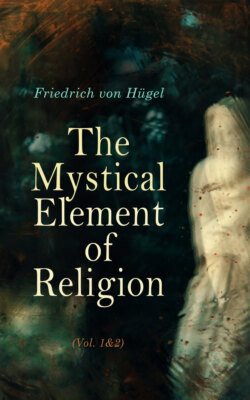Читать книгу The Mystical Element of Religion (Vol. 1&2) - Friedrich von Hügel - Страница 95
На сайте Литреса книга снята с продажи.
3. Probable course of Catherine’s confession-practice.
ОглавлениеWith these four points before us, let us attempt to reconstruct some outline of what really happened in her own case, and try and show what constituted the specifically Catholic quality of this her practice, so unusual in the middle and later ages of the Church. We shall, then, do wisely, I think, by considering that the “twenty-five years,” alleged by her own self, were, as a strict matter of fact, not more than twenty-one;[73] that during the four first convert years that preceded this middle period, just as during the last eleven which succeeded it, she had recourse to confession with the frequency considered normal in and for these times, in the case of a daily communicant living in the world; but that, during the intervening period, she was allowed to substitute that simple occasional, perhaps only annual, presentation of herself and declaration to the priest in the place of confession proper, which we have seen to be considered, in a case of such a purity of soul as hers, as sufficient for fulfilling the Church’s precept, by a practical consensus of all the great casuist authorities. And thus we have here again a memorable, and this time a long-persisting, instance of how the intrinsic and operative connection between the Individual and the Social, the Mystical and the Institutional elements of Religion is not a simple identity or coextension,—a point which we already found exemplified during the first hours of her convert life.
And the Catholic spirit in this her present course will consist in her full observance of all to which the Church strictly obliges; in her readiness at all times to walk in the ordinary way, and in her repeated attempts, even during this second period, to do so; in her actually and fervently following the ordinary course whenever she could, i.e. in the first and last period; and finally in her ever faithfully obeying the promptings of God’s Spirit which, by various converging spiritual peculiarities, circumstances and means, showed, with practical plainness, the kind and degree of extraordinary interior acts and habits which were to be, in large part, her form of the “Mind of the Church.” For it is indeed certain that the special characteristic of the Catholic mind is not, necessarily, universally and finally, the conception and practice of sanctity under the precise form of the devotional spirit and habits special to the particular part or period of the Church in which that individual Catholic’s lot may be cast. What is thus characteristic, is the continuous and sensitive conviction that there is something far-reaching and important beyond the Church’s bare precepts, for every soul that aims at sanctity, to find out and to do; that this something (sc. the Church’s mind) is, always and for all, presumably, the most fervent form and degree of the devotional temper and habits of the Church, as practised in that time and country; and that it is for God Himself, if He so pleases, to indicate to the soul that He now wants its fervour to consist in an observance of the Church’s precepts and spirit under a form and with an application partially different from the most fervent practice of the ordinary devotions of that time and place, though this new observance will be no less costing or heroically self-renouncing than the other. And this He does usually by slow, often simply cumulative and indirect, but always solid, painful, and practically unmistakable, because unsought, means and experiences,—all these attained to well within the Church. For the Church’s life and spirit, which is but the extension of the spirit of Christ Himself, is, like all that truly lives at all, not a sheer singleness, but has a mysterious unity in and by means of endless variety. Even at any one moment that spirit expresses itself in numerous variations, by means of various races, rites, orders, schools, and individuals. And yet not the sum-total of all these simultaneously present variations is ever as rich as is the sum-total of that spirit’s successive manifestations in the past. Nor once more can this latter sum be taken as anticipating all the developments and adaptations which that ever-living spirit will first occasion and then sanction in His special organ, the Church. Catherine’s particular, divinely impelled substitute for the ordinary devotional practice shall be described later on.
